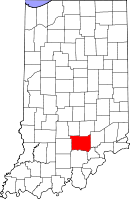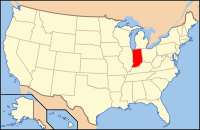- Jackson County, Indiana
-
Jackson County, Indiana 
Location in the state of Indiana
Indiana's location in the U.S.Founded Jan 1, 1816 Named for Andrew Jackson Seat Brownstown Area
- Total
- Land
- Water
513.91 sq mi (1,331 km²)
509.31 sq mi (1,319 km²)
4.60 sq mi (12 km²), 0.90%Population
- (2010)
- Density
42,376
83/sq mi (32.12/km²)Congressional district 9th Time zone Eastern: UTC-5/-4 Footnotes: Indiana county number 36
Jackson County is a county located in the U.S. state of Indiana. As of 2010, the population was 42,376.[1] The county seat is Brownstown.[2]
Contents
History
Jackson County was formed in 1816. It was named for Andrew Jackson, who defeated the British in 1815 at the Battle of New Orleans in the War of 1812,and then Signed the Indian Removal Act sending all Indians in Indiana west. He had become president at the time.
Jackson County was the site of the first recorded train robbery of a moving train in the United States. On October 6, 1866 the Reno Gang robbed an Ohio and Mississippi Railway train making off with over $10,000.They were nicknamed: "The Jackson Theives" later on.[3]
Jackson County is home to the longest 3-span covered bridge in the world; The Medora Covered Bridge. However, due to decades of neglect the bridge is on the verge of collapse and has been closed to pedestrian traffic. Another long neglected covered bridge, the Bells Ford Bridge, which is believed the last remaining Post Truss bridge in the world, succumbed to similar neglect, collapsing into the White River on January 2, 2006.
Because the Bell's Ford Bridge used a metal truss it was able to be largely salvaged, however, the Commissioner President Gary Darlage has been quoted as saying: "There is nothing left of the Bell Ford Bridge and I will not spend another tax dollar on it. Ninety percent of the people in this county think it is asinine to even consider rebuilding that bridge. By asking for any amount of money to be used on it, you are asking me to do something I don’t believe is right." Although it has been brought to Darlage's attention that federal funds could be used to restore the Bell's Ford Bridge, Darlage has refused to request federal funds, saying, "I guess I’m just not a historic person. The average taxpayer sees it as their tax money, even if it is federal money."[citation needed]
Geography
According to the 2010 census, the county has a total area of 513.91 square miles (1,331.0 km2), of which 509.31 square miles (1,319.1 km2) (or 99.10%) is land and 4.60 square miles (11.9 km2) (or 0.90%) is water.[4]
Cities and towns
Townships
Adjacent counties
- Brown County (north-northwest)
- Bartholomew County (north-northeast)
- Jennings County (east)
- Scott County (southeast)
- Washington County (south)
- Lawrence County (west)
- Monroe County (northwest)
Major highways
Sources: National Atlas,[5] U.S. Census Bureau[6]
National protected areas
- Hoosier National Forest (part)
- Muscatatuck National Wildlife Refuge (part)
Climate and weather
Brownstown, Indiana Climate chart (explanation) J F M A M J J A S O N D 3.237192.843223.753314.76440574514.182604.485644.48461378533.367404.154333.44224Average max. and min. temperatures in °F Precipitation totals in inches Source: The Weather Channel[7] Metric conversion J F M A M J J A S O N D 813-7726-69512-1120184127231110528161122918111291677261283194103121876-4Average max. and min. temperatures in °C Precipitation totals in mm In recent years, average temperatures in Brownstown have ranged from a low of 19 °F (−7 °C) in January to a high of 85 °F (29 °C) in July, although a record low of −23 °F (−31 °C) was recorded in January 1977 and a record high of 106 °F (41 °C) was recorded in July 1954. Average monthly precipitation ranged from 2.84 inches (72 mm) in February to 5.01 inches (127 mm) in May.[7]
Government
The county government is a constitutional body, and is granted specific powers by the Constitution of Indiana, and by the Indiana Code.
County Council: The county council is the legislative branch of the county government and controls all the spending and revenue collection in the county. Representatives are elected from county districts. The council members serve four year terms. They are responsible for setting salaries, the annual budget, and special spending. The council also has limited authority to impose local taxes, in the form of an income and property tax that is subject to state level approval, excise taxes, and service taxes.[8][9]
Board of Commissioners: The executive body of the county is made of a board of commissioners. The commissioners are elected county-wide, in staggered terms, and each serves a four-year term. One of the commissioners, typically the most senior, serves as president. The commissioners are charged with executing the acts legislated by the council, collecting revenue, and managing the day-to-day functions of the county government.[8][9]
Court: The county maintains a small claims court that can handle some civil cases. The judge on the court is elected to a term of four years and must be a member of the Indiana Bar Association. The judge is assisted by a constable who is also elected to a four-year term. In some cases, court decisions can be appealed to the state level circuit court.[9]
County Officials: The county has several other elected offices, including sheriff, coroner, auditor, treasurer, recorder, surveyor, and circuit court clerk Each of these elected officers serves a term of four years and oversees a different part of county government. Members elected to county government positions are required to declare party affiliations and to be residents of the county.[9]
Jackson County is part of Indiana's 9th congressional district and is represented in Congress by Republican Todd Young.[10] It is also part of Indiana Senate districts 44 and 45[11] and Indiana House of Representatives districts 65, 66 and 73.[12]
Demographics
As of the census[13] of 2000, there were 41,335 people, 16,052 households, and 11,573 families residing in the county. The population density was 81 people per square mile (31/km²). There were 17,137 housing units at an average density of 34 per square mile (13/km²). The racial makeup of the county was 96.13% White, 0.55% Black or African American, 0.24% Native American, 0.78% Asian, 0.06% Pacific Islander, 1.54% from other races, and 0.70% from two or more races. 2.69% of the population were Hispanic or Latino of any race. 33.7% were of American, 30.6% German, 8.1% English and 7.9% Irish ancestry according to Census 2000.
There were 16,052 households out of which 33.70% had children under the age of 18 living with them, 58.10% were married couples living together, 9.90% had a female householder with no husband present, and 27.90% were non-families. 23.50% of all households were made up of individuals and 10.10% had someone living alone who was 65 years of age or older. The average household size was 2.54 and the average family size was 2.98.
In the county the population was spread out with 25.50% under the age of 18, 8.80% from 18 to 24, 30.30% from 25 to 44, 22.10% from 45 to 64, and 13.30% who were 65 years of age or older. The median age was 36 years. For every 100 females there were 97.30 males. For every 100 females age 18 and over, there were 94.60 males.
The median income for a household in the county was $39,401, and the median income for a family was $45,210. Males had a median income of $31,505 versus $22,301 for females. The per capita income for the county was $18,400. About 6.50% of families and 8.50% of the population were below the poverty line, including 9.70% of those under age 18 and 9.00% of those age 65 or over.
Historical populations Census Pop. %± 1820 4,010 — 1830 4,870 21.4% 1840 8,961 84.0% 1850 11,047 23.3% 1860 16,286 47.4% 1870 18,974 16.5% 1880 23,050 21.5% 1890 24,139 4.7% 1900 26,633 10.3% 1910 24,727 −7.2% 1920 24,228 −2.0% 1930 23,731 −2.1% 1940 26,612 12.1% 1950 28,237 6.1% 1960 30,556 8.2% 1970 33,187 8.6% 1980 36,523 10.1% 1990 37,730 3.3% 2000 41,335 9.6% 2010 42,376 2.5% Sources: United States Department of Commerce,
Bureau of the Census, Population Division[14]
Census Quickfacts[1]See also
External links
References
- ^ a b "Jackson County QuickFacts". United States Census Bureau. http://quickfacts.census.gov/qfd/states/18/18071.html. Retrieved 2011-09-25.
- ^ "Find a County". National Association of Counties. http://www.naco.org/Counties/Pages/FindACounty.aspx. Retrieved 2011-06-07.
- ^ http://www.history.com/this-day-in-history.do?action=VideoArticle&id=51742
- ^ "Census 2010 U.S. Gazetteer Files: Counties". United States Census. http://www.census.gov/geo/www/gazetteer/files/Gaz_counties_national.txt. Retrieved 2011-10-10.
- ^ National Atlas
- ^ U.S. Census Bureau TIGER shape files
- ^ a b "Monthly Averages for Brownstown, Indiana". The Weather Channel. http://www.weather.com/weather/wxclimatology/monthly/graph/USIN0070. Retrieved 2011-01-27.
- ^ a b Indiana Code. "Title 36, Article 2, Section 3". IN.gov. http://www.in.gov/legislative/ic/code/title36/ar2/ch3.html. Retrieved 2008-09-16.
- ^ a b c d Indiana Code. "Title 2, Article 10, Section 2". IN.gov. http://www.in.gov/legislative/ic/code/title3/ar10/ch2.pdf. Retrieved 2008-09-16.
- ^ "Conressman Todd Young". House.Gov. http://toddyoung.house.gov/. Retrieved 2011-05-15.
- ^ "Indiana Senate Districts". State of Indiana. http://www.in.gov/sos/elections/3006.htm. Retrieved 2011-07-14.
- ^ "Indiana House Districts". State of Indiana. http://www.in.gov/sos/elections/3005.htm. Retrieved 2011-07-14.
- ^ "American FactFinder". United States Census Bureau. http://factfinder.census.gov. Retrieved 2008-01-31.
- ^ Forstall, Richard L. (editor) (1996). Population of states and counties of the United States: 1790 to 1990 : from the twenty-one decennial censuses. United States Department of Commerce, Bureau of the Census, Population Division. pp. 50–53. ISBN 0-934213-48-8. http://books.google.com/books?id=Z12v1lrkv2IC&lpg=PA50&pg=PA50#v=onepage&q&f=false.

Monroe County Brown County and Bartholomew County 
Lawrence County 
Jennings County  Jackson County, Indiana
Jackson County, Indiana 

Washington County Scott County Municipalities and communities of Jackson County, Indiana City Towns Townships Brownstown | Carr | Driftwood | Grassy Fork | Hamilton | Jackson | Owen | Pershing | Redding | Salt Creek | Vernon | Washington
Unincorporated
communitiesAcme | Bald Knobs | Bobtown | Chestnut Ridge | Clear Spring | Cortland | Dudleytown | Ewing | Fleming | Freetown | Hangman Crossing | Houston | Kriete Corner | Kurtz | Little Acre | Maumee | New Elizabethtown | New Farmington | Norman | Reddington | Retreat | Rockford | Shields | Sparksville | Spraytown | Surprise | Tampico | Uniontown | Vallonia | Weddleville | Wegan
Categories:- Indiana counties
- 1816 establishments in the United States
- Populated places established in 1816
- Jackson County, Indiana
Wikimedia Foundation. 2010.
